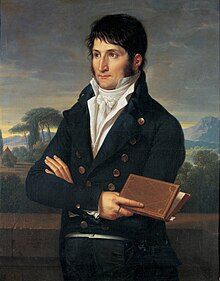Lucien Bonaparte
| Lucien Bonaparte | |
|---|---|
| 1st Prince of Canino and Musignano | |

Portrait by François-Xavier Fabre
|
|
| Prince of Canino | |
| Reign | 18 August 1814 – 29 June 1840 |
| Successor | Charles Lucien Bonaparte |
| Prince of Musignano | |
| Reign | 21 March 1824 – 29 June 1840 |
| Successor | Charles Lucien Bonaparte |
| Born | 21 May 1775 Ajaccio, Corsica, France |
| Died | 29 June 1840 (aged 65) Viterbo, Papal States |
| Spouse |
Christine Boyer Alexandrine de Bleschamp |
| Issue |
Charlotte Bonaparte, Princess Mario Gabrielli Victoire Bonaparte Christine Bonaparte, Lady Stuart Charles Lucien Bonaparte, 2nd Prince of Canino and Musignano Letizia Bonaparte, Lady Thomas Wyse Joseph Lucien Bonaparte Jeanne Bonaparte, Marchessa Honorato Honorati Paul Marie Bonaparte Louis Lucien Bonaparte Pierre Napoleon Bonaparte Antoine Bonaparte Alexandrine Bonaparte, Countess di Laviano Constance Bonaparte |
| House | Bonaparte |
| Father | Carlo Buonaparte |
| Mother | Letizia Ramolino |
| Religion | Roman Catholicism |
Lucien Bonaparte, Prince Français, 1st Prince of Canino and Musignano (born Luciano Buonaparte; 21 May 1775 – 29 June 1840), was a French statesman, the third surviving son of Carlo Buonaparte and his wife Letizia Ramolino.
Lucien was a younger brother of Joseph and Napoleon Bonaparte, and an older brother of Elisa, Louis, Pauline, Caroline and Jérôme Bonaparte. Lucien held genuinely revolutionary views, which led to an often abrasive relationship with his brother Napoleon, who seized control of the French government in 1799, when Lucien was 24.
Lucien Bonaparte's rise during the French Revolution, unlike Napoleon Bonaparte's other siblings, was not based on familial connections or nepotism. This was one of the issues that caused friction between Lucien and Napoleon in the early years of the 19th century, as their political differences deepened. Both Lucien and Napoleon had a very keen interest in historical antiquity as youngsters.
Lucien was born in Ajaccio, Corsica in 1775, and was educated in mainland France, at the College d'Autun, the military school in Brienne, and at seminary in Aix-en-Provence. In 1769 the Corsican Republic had been conquered by French forces and annexed into France. Lucien's father Carlo Bonaparte had been a strong supporter of Corsican patriots under Pasquale Paoli, but later switched to become a supporter of French rule.
Lucien returned to Corsica at the outbreak of the French Revolution in 1789 and became an outspoken speaker in the Jacobin Club at Ajaccio, where he renamed himself "Brutus". An ally of Maximilien Robespierre before and during the Reign of Terror, he was briefly imprisoned (at Aix-en-Provence) after the coup of 9 Thermidor on 27 July 1794, which deposed Robespierre and led to Robespierre's execution the following day.
...
Wikipedia
